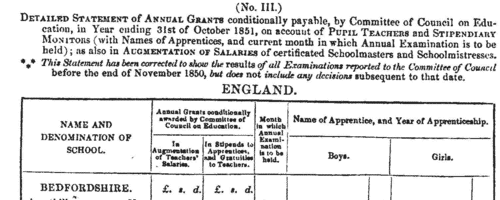Dex Surname Ancestry ResultsOur indexes 1000-1900 include entries for the spelling 'dex'. In the period you have requested, we have the following 5 records (displaying 1 to 5): Buy all | | | Get all 5 records to view, to save and print for £26.00 |
These sample scans are from the original record. You will get scans of the full pages or articles where the surname you searched for has been found. Your web browser may prevent the sample windows from opening; in this case please change your browser settings to allow pop-up windows from this site. Liberate Rolls
(1245-1251)
These chancery liberate rolls of the 30th to 35th years of the reign of Henry III of England record the details of payments and allowances as part of the administration of government. Most entries start with the Latin words 'liberate', meaning 'deliver', or 'allocate', meaning allow. There are also 'contrabreves', warrants mainly to sheriffs of shires, assigning them tasks and allowing expenses. Most of the entries relate to England and Wales, but there are occasional references to Ireland and the English possessions in France.DEX. Cost: £4.00.  | Sample scan, click to enlarge

| Yorkshire West Riding Freeholders
(1817)
A ballot was held at Wakefield 12 to 16 May 1817 for the choice of a new Register (registrar) for the West Riding Registry of Deeds, following the death of J. A. Busfeild esq. The candidates were Francis Hawksworth, esq. (1) and William Lister Fenton Scott esq. (2). 2544 freeholders voted, qualification being male adults in possession of at least £100 per annum. This alphabetical poll book was compiled from the scrutators' and poll clerks' books: it gives full name (surname first) and residence, as well as the situation of the qualifying freehold. Each man's name is preceded by a 1 or 2, indicating for whom his vote was cast.DEX. Cost: £6.00.  | Sample scan, click to enlarge

| Workers at Mitchell, Hardie & Scott's Cotton Mill, Manchester
(1818)
The minutes of evidence taken before the Lords Committee on the Cotton Factories Bill include a series of reports by medical men as to the general health of the mill workers in April 1818. For each factory there is a complete list of workers, giving full name, age, how long employed in a factory, health (in general terms, such as 'Good' or 'Sickly'), and any chronic disease or 'distortion', cause and duration - with slight variations from report to report. The physicians examined several hundred people each day, asking such questions as 'Have you any swellings or sores anywhere?', 'Are your limbs straight?', 'Have you a good appetite for food?', 'Do you conceive yourself to be in good health?', and all concluded that the health of the mill workers was good, and that the workers were cheerful. This is the report for Mitchell, Hardie and Scott's cotton spinning factory in Manchester, 17 April 1818.DEX. Cost: £6.00.  | Sample scan, click to enlarge

| Tradesmen of Lynn in Norfolk
(1292-1836)
Lists of admissions of freemen of Lynn from the earliest surviving records to 1836 were published by the Norfolk and Norwich Archaeological Society in 1913. These lists were extracted from the tallage rolls of 1291 to 1306; the Red Register of Lynn from 1342 to 1395; from the assembly rolls for the reigns of Henry IV and V [1399 to 1422]; from the hall books from 1423; and from a list of freemen starting in 1443 in the Book of Oaths (but itself abstracted from entries in the hall books). Freedom of the borough, necessary to practise a trade there, could be obtained by birth (in which case the father's name and occupation are usually given); by apprenticeship to a freeman (the master's name and occupation being given); by gratuity; or by purchase. Both the freemen and the masters listed are indexed here. The main abbreviations used are: B., freedom taken up by right of birth; A., freedom taken up by right of apprenticeship; G., freedom granted by order of assembly (gratuity); and P., freedom acquired by purchase.DEX. Cost: £4.00.  | Sample scan, click to enlarge

| Pupil Teachers in Lancashire: Boys
(1851)
The Committee of Council on Education awarded annual grants for the training and support of pupil teachers and stipendiary monitors in schools in England, Wales, Scotland, the Isle of Man and the Channel Islands. Pupil teachers started training between the ages of 13 and 15, and 'must not be subject to any bodily infirmity likely to impair their usefulness as Pupil Teachers, such as scrofula, fits, asthma, deafness, great imperfections in the sight or voice, the loss of an eye from constitutional disease, or the loss of an arm or leg, or the permanent disability of either arm or leg, curvature of the spine, or a hereditary tendency to insanity'.
They also had to obtain certificates from the managers of the school (and their clergyman, in the case of Church of England schools) as to their moral character and that of their family; good conduct; punctuality, diligence, obedience, and attention to duty; and attentiveness to their religious duties.
This detailed statement in the annual report of the committee for the year ending 31 October 1851 lists schools by county, giving:
1. Name and Denomination of School, with these abbreviations - B, British and Foreign School Society; F. C., Free Church of Scotland; H. C., Home and Colonial School Society; N., National Society, or connected with the Church of England; R. C., Roman Catholic Poor-School Committee; Wesn., Wesleyan Methodist.
2. Annual grants conditionally awarded by the committee in augmentation of teachers' salaries, and in stipends to apprentices, and gratuities to teachers.
3. Month in which annual examination was to be held.
4. Names of apprentices, giving surname and initials, and year of apprenticeship. Stipendiary monitors are indicated by (S. M.).DEX. Cost: £6.00.  | Sample scan, click to enlarge

|
Research your ancestry, family history, genealogy and one-name study by direct access to original records and archives indexed by surname.
|







